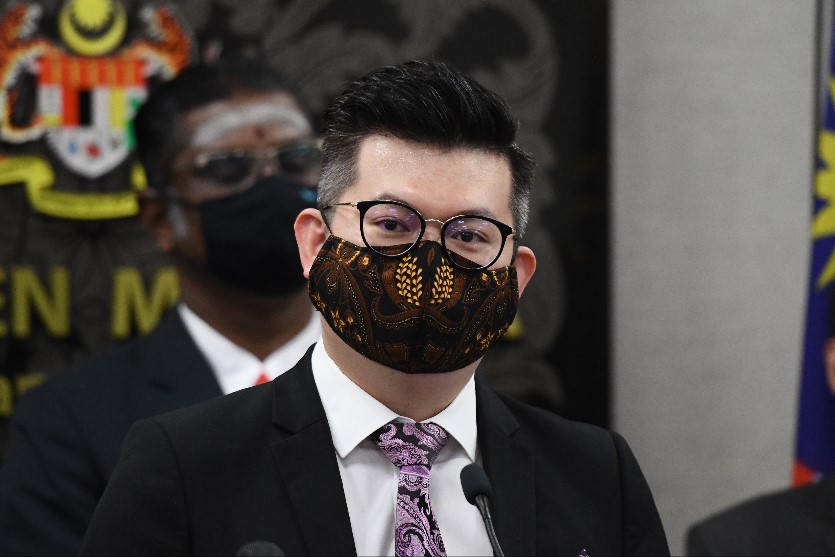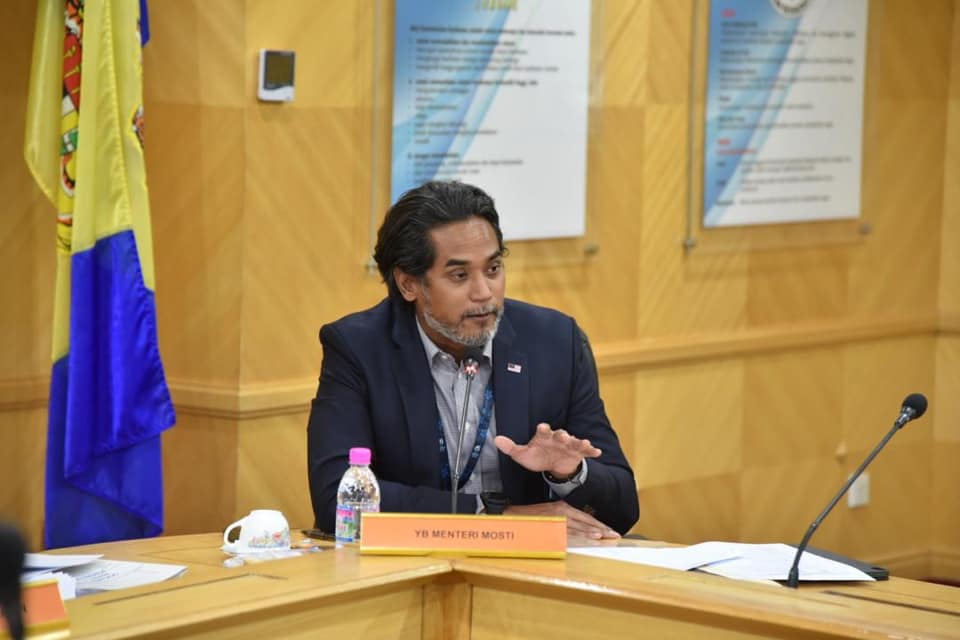KUALA LUMPUR, Dec 7 — The Malaysian government’s Covid-19 vaccine agreements with US pharmaceutical company Pfizer and with the global COVAX Facility do not involve any third parties, Khairy Jamaluddin said today.
The science, technology, and innovation minister also explained that the government has so far only procured Covid-19 vaccines, directly, from two producers — Pfizer and COVAX — even as various Malaysian companies sign distribution agreements with vaccine developers from China, including MyEG Services Bhd, a digital government services provider that has no background in the health care or logistics sector in Malaysia.
“The procurement made by the government is only with COVAX for 10 per cent of the population and with Pfizer for 20 per cent of the population that was made directly with Pfizer without the use of any middleman or third party,” Khairy said while winding up the debate at the committee stage for the Ministry of Science, Technology, and Innovation (MOSTI) at the Dewan Rakyat today.
“Distribution is also a matter that requires regulatory approval. We won’t simply give it to any company without distribution capacity to maintain the stability of the vaccine.”
Malaysia’s local pharmaceutical distributors currently have very limited capacity to store or deliver large quantities of vaccines at Arctic temperatures. Vaccines, including those for Covid-19, can be rendered unusable if stored at temperatures exceeding their specifications.
Khairy agreed that the RM3 billion allocated for Covid-19 vaccines is not in MOSTI’s budget in the Estimated Federal Expenditure 2021, as pointed out by former Health Minister Dzulkefly Ahmad during his debate on MOSTI’s budget.
“I admit that it is not in the Estimated Federal Expenditure 2021 document because it will be presented in the Covid-19 fund,” the minister of MOSTI said.
Khairy said that the RM3 billion allocation will be inclusive of procurement, storage, and transport for vaccinating 70 per cent of the population with coronavirus vaccines, and that it is not just for Pfizer’s vaccine alone.
The Rembau MP added that the price given by Pfizer to Malaysia for its mRNA vaccine, which has a storage temperature of -70 degrees’ Celsius, is an agreement covering both the price and shipping of 12.8 million doses, but does not include storage. He told Parliament earlier today that the Pfizer agreement covered transportation costs too.
“The RM3 billion is the overall total and we will try from the overall total to count for everything — procurement, including storage and transport. So far, we are within our target,” Khairy said in reply to Dzulkefly, who asked him to clarify a viral message that claimed RM3 billion will all be spent on Pfizer’s vaccine (RM2 billion) and for logistics (RM1 billion) related to the Pfizer vaccine.
In a recent viral WhatsApp message attributed to Gua Musang MP Tengku Razaleigh Hamzah, it alleged that more than RM2 billion has been used just to purchase Pfizer’s mRNA vaccine, while RM1 billion will be required to keep the vaccine at -80 degrees’ Celsius. Pfizer’s Covid-19 vaccine’s storage temperature is -70 degrees’ Celsius, not -80 degrees’ Celsius.
The message purportedly attributed to Tengku Razaleigh was full of vaccine misinformation that touted treating the Covid-19 disease with “holistic, herbal and complimentary [sic] medicine” and questioning so-called “secret ingredients” in mRNA vaccines. The WhatsApp message listed the name and contact number of Tengku Razaleigh’s personal assistant Mohd Lukhman Ghani.
“I can categorically state in the Parliament, Dewan Rakyat, that this is completely unfounded and incorrect,” Khairy said responding to that viral news.
“I cannot reveal the actual price of our procurement with Pfizer because it’s a non-disclosure agreement. Our deal with Pfizer and also COVAX is still way, way within our range of RM3 billion for 70 per cent of the population.”
Companies Are Free To Pursue Any Vaccine Deals, But It All Comes Down To NPRA’s Approval
The minister also said that any private companies can make private deals with international vaccine companies, but those deals are not related to the government’s vaccine agreements.
“Any company can discuss with any international companies to be their agent, distributor, etc and we cannot control if they want to make commercial arrangements with any companies or vaccine manufacturers,” the Umno lawmaker said.
“If they do not get approval from Clinical Research Malaysia, for example, they can’t run clinical trials here. If they do not get approval from the National Pharmaceutical Regulatory Agency (NPRA) which is under the Ministry of Health (MOH), they cannot bring in the vaccine into Malaysia.”
Earlier today, Malaysia’s digital government services provider MyEG announced it had signed an agreement with China-based pharmaceutical company, Anhui Zhifei Longcom Biopharmaceutical Co Ltd, to conduct its Phase Three clinical trials of Zhifei’s vaccine in Malaysia.
Previously, engineering and construction company Bintai Kinden Corp Bhd had also signed a distribution and licensing agreement with US-based Generex Biotechnology Corp and its subsidiary NuGenerex Immuno-Oncology Inc, which has been working to develop a peptide vaccine against the coronavirus using synthetic peptides (peptides are smaller versions of proteins).
“For the government, MOSTI and MOH, we can’t stop these companies that have nothing to do with medicine or logistics and the like, they may try to pivot to other industries. They do private commercial deals with international companies. However, I want to inform the investors’ market that these announcements do not mean they have obtained government procurement,” Khairy said, stressing that the government’s vaccine agreements so far are only with Pfizer and COVAX.
Khairy also said that distribution is subject to the purview of regulatory bodies, which means any companies who want to distribute the vaccine but do not have the capacity will not be allowed to distribute the vaccine.
“There are vaccine manufacturers, for example, from China that are interested to come here not only to sell, but also for the fill-and-finish process, but that also needs regulatory approval before being approved,” Khairy said.
The Dewan Rakyat passed MOSTI’s budget at the committee stage in a voice vote today.
Rural People Shouldn’t Be Left Behind

Bandar Kuching MP Dr Kelvin Yii, during his debate on MOSTI’s budget at the committee stage, said that no one should be left behind, especially those living in rural areas in Sabah and Sarawak, in getting Covid-19 vaccines.
The DAP lawmaker from Sarawak questioned the government on how public health providers could maintain a cold temperature for the vaccines in rural areas, where electricity supply is unstable and some areas fully depend on generators.
“How do they maintain and monitor the temperature in every step of the way in the cold chain?” Dr Yii said.
“On top of that, since Pfizer is a two-dose regimen, how will they get those especially living in the rural areas to be compliant and come back to get their second dose, so they will develop enough and the required titre of antibodies?”
He also asked the government on how they intend to keep the vaccine in rural areas during the period between each dose, as if there’s improper storage, the mRNA vaccine could be unusable. The second dose of Pfizer’s vaccine must be administered three weeks after the first dose.
Dr Yii, who is a trained medical practitioner, also said that the government should be starting proper communications now itself to educate the public on the importance of a Covid-19 vaccine in order to prevent misinformation, confusion, and hesitancy.
“Resources should be allocated to properly educate and fight misinformation and pseudoscience, which may increase vaccine hesitancy which will affect its distributions,” the Bandar Kuching MP said.
“All these will require a whole of-society approach. That is why the National Vaccine Roadmap that is being developed by MOSTI must include different research institutes, medical fraternities including the private practice, and even elected representatives from across the political divide — so that there is a joint collaboration to exemplify and coordinate communications to make sure this vaccine reaches its intended target, and that no one gets left behind regardless of their status, demographics or background.”








